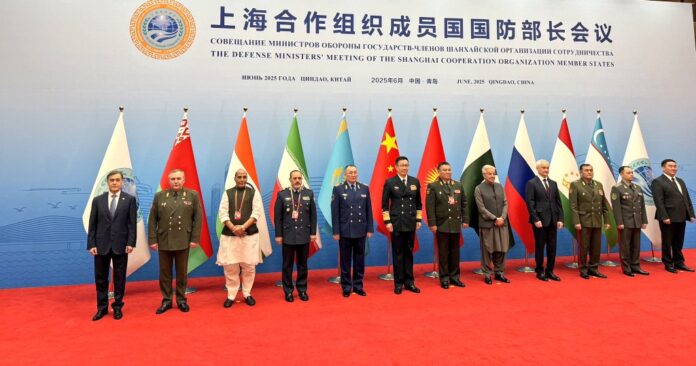Qingdao — India’s Defence Minister Rajnath Singh refused to put his signature on a joint communiqué at the Shanghai Cooperation Organisation (SCO) meeting in Qingdao after objecting to key edits. The final draft omitted a reference to the recent terror attack in Pahalgam, which claimed the lives of 26 civilians, and oddly included a line on Balochistan, interpreted by India as a veiled implication that India is responsible for unrest there.
Defence Minister Singh strongly protested the document’s failure to mention the Pahalgam incident. That attack, attributed to The Resistance Front, a Lashkar-e-Taiba stem, specifically targeted mostly Hindu tourists on April 22, killing civilians from India and Nepal after attackers singled them out by their religious identity.
India objected to what it called a “double standard” in the approach to terrorism. Not only was Pahalgam left unacknowledged, but the wording on Balochistan appeared to subtly shift blame onto India, a move New Delhi found unacceptable.
At this two-day defence ministers’ summit, which began June 25 under China’s chairmanship, Mr Singh emphasised that “peace and prosperity cannot coexist with terrorism,” warning against using terror as a policy tool and stressing the necessity of accountability for all sponsors and perpetrators.
Inaction on calling out specific terror incidents, he argued, undermines international cooperation and allows double standards to persist.
What does it mean?
A diplomatic fault line emerged when Defence Minister Singh declined to sign the joint communique. The reason: the document omitted any mention of the recent Pahalgam terror attack, in which 26 civilians were killed, while including a reference to Balochistan that India viewed as politically loaded. This decision underscores India’s growing frustration with what it sees as selective outrage and double standards within multilateral groupings.
The omission of Pahalgam is particularly glaring given the SCO’s mandate to fight terrorism, extremism, and separatism. The attack, claimed by a Pakistan-based proxy group, targeted unarmed civilians and had cross-border implications. India’s push to include the incident in the final statement was likely an attempt to force regional acknowledgement of its security concerns, particularly those linked to Pakistan. That this was blocked, likely by China and Pakistan, reflects how strategic rivalries within the SCO often override its cooperative ambitions.
The reference to Balochistan, viewed by India as a subtle attempt to paint it as a destabilising force, further exposed geopolitical tensions. It represents Pakistan’s ongoing effort to deflect attention from its own role in cross-border terrorism by internationalising its internal issues.
This incident also reflects the limitations of the SCO. Despite its impressive membership, the organisation is deeply fractured on key security concerns. For India, the forum offers diminishing returns if its core security issues are ignored or misrepresented. Rajnath Singh’s refusal to endorse the statement signals that India will no longer play along diplomatically when its red lines are crossed.
While the SCO remains a significant regional platform, moments like this highlight its struggle to reconcile the competing interests of its members, especially when terrorism and sovereignty are at the heart of the dispute.
About SCO
The Shanghai Cooperation Organisation (SCO) is a Eurasian political, economic, and security alliance established in 2001. Initially founded by China, Russia, Kazakhstan, Kyrgyzstan, Tajikistan, and Uzbekistan, the grouping expanded to include India and Pakistan in 2017, and later Iran in 2023. It represents one of the world’s largest regional organisations, both in terms of geographic coverage and population.
The SCO was originally focused on regional security, particularly counterterrorism, separatism, and extremism. Over time, its agenda has broadened to include economic cooperation, connectivity, energy collaboration, and cultural exchanges. The Regional Anti-Terrorist Structure (RATS), headquartered in Tashkent, serves as the SCO’s central body for intelligence sharing and counterterror operations.
While the SCO avoids formal military alliances like NATO, it conducts joint military exercises and promotes dialogue on regional stability. However, internal rivalries, particularly between India and Pakistan, and India’s growing tensions with China, have limited its cohesion and decision-making in recent years.
Under rotating presidencies, member states take turns hosting annual summits and steering the group’s agenda. Despite its limitations, the SCO remains a key diplomatic platform in Asia, offering a rare space where rivals engage directly. It is increasingly viewed as a counterweight to Western-led groupings in global affairs.



